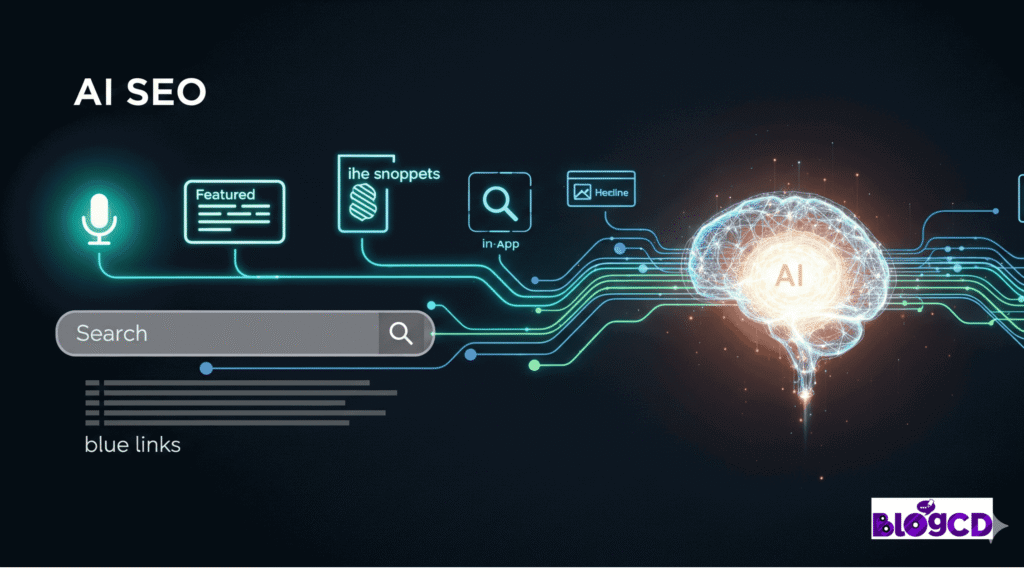Traditional SEO is no longer enough. You can rank #1 on Google and still lose visibility to a competitor with a weaker product or service. Why? Because search behavior has shifted.
Billions of queries now flow through LLMs (Large Language Models) like ChatGPT, Perplexity, Claude, and Google’s Search Generative Experience (SGE). AI-powered answers are often what users see first — not the top 10 links.
This means that the new game is AI SEO — optimizing not just for search engines, but for AI-driven responses. Here’s a proven framework, tested across client projects, that works today.
1. The Entity Recognition Game
AI doesn’t “think” in keywords the way traditional SEO does. It thinks in entities — people, companies, places, and concepts.
When someone asks:
👉 “Who’s the best SEO agency?”
AI systems don’t just scan web pages. They scan entities connected to credibility. If you’re not recognized as one, you’re invisible.
How to Become an Entity AI Recognized?
- Claim every business listing: Google Business Profile, Bing Places, Apple Maps, Yelp, Crunchbase, Clutch, G2, and industry directories.
- Get cited in Wikipedia (or Wikidata): Even a simple reference strengthens your entity footprint.
- Claim your Knowledge Panel: Verify and enrich it with accurate details.
- NAP Consistency: Keep your Name, Address, Phone number identical across at least 50+ listings.
💡 Think of this step as building your “passport” for AI systems. The more official stamps you have, the easier it is for AI to verify your credibility.
2. Build a Question-Answer Architecture
AI doesn’t pull long blog posts. It pulls direct answers.
Your content should function like a Q&A database. That means restructuring content into bite-sized, AI-friendly answers.
Example Format
H2: How long does SEO take?
Direct Answer: SEO typically takes 3–6 months to show measurable results.
Supporting Bullets:
- Depends on competition and domain authority
- New websites may take longer
- Strong link-building accelerates timelines
💡 Pro Tip: Drop your target query into ChatGPT or Perplexity. Study how AI answers it and reverse-engineer your own content to fit the same format.
3. Reputation Signals AI Reads
AI systems read what people say about you — everywhere. This goes far beyond your own site.
Key off-site reputation signals include:
- Reddit comments mentioning your brand or service
- Quora answers linking back to your expertise
- LinkedIn posts where others tag or endorse you
- Forum discussions where you provide value
- YouTube comments referencing your work
💡 The takeaway? Don’t just market — participate in conversations. AI reads social proof as expertise.
4. The Citation Multiplication Strategy
AI trusts citations from sources it already respects.
For example: when Harvard Business Review or TechCrunch cites a study, AI is more likely to repeat it than the original source.
How to Trigger AI-Friendly Citations
- Pitch journalists with expert quotes (use platforms like HARO or Qwoted).
- Comment on trending industry news with data-backed insights.
- Publish original research that’s easy for larger outlets to cite.
- Guest post on sites already trusted in your industry.
💡 One high-authority citation can trigger multiple AI mentions across platforms.
5. Conversational Content Patterns
People don’t type like robots anymore. They ask AI tools questions in natural language.
Bad: “Chicago SEO Services – Professional SEM Company”
Good: “7 Best SEO Companies in Chicago (2025 Guide)”
Bad: “Link building strategies for higher rankings”
Good: “How do I get high-quality backlinks without penalties?”
💡 Rewriting content around real questions not only helps AI pick you up, but also improves click-through rates from human readers.
6. The Review-to-Recommendation Pipeline
AI doesn’t just read your star ratings — it reads the words in reviews.
Instead of asking customers for “a quick review,” guide them with questions:
- How did our product/service solve your challenge?
- What measurable results did you see?
- Would you recommend us to a friend or peer?
These details get embedded into AI training data, increasing your chances of being recommended in AI answers.
AI crawls far beyond Google. It scans wherever content lives. The more touchpoints, the more visible your entity.
Key platforms to repurpose on:
- Blog (your home base)
- LinkedIn & Medium (professional visibility)
- Industry newsletters & forums
- Podcasts (transcripts matter for AI crawlers)
- YouTube (video descriptions are indexed)
💡 Think of each platform as another “node” in your entity map. The more you have, the stronger your presence.
Traditional SEO vs. AI SEO
- Traditional SEO = Rank pages for keywords.
- AI SEO = Rank your entity and expertise for conversational queries.
The game has changed. Optimizing for AI isn’t about tricking algorithms — it’s about positioning yourself as the credible expert AI should recommend.
Final Thoughts
If you’re still only chasing #1 rankings, you’re playing an outdated game. The real opportunity lies in becoming the entity AI systems choose to recommend.
To win in the AI SEO era:
- Build your entity recognition footprint.
- Restructure content into direct Q&As.
- Generate off-site reputation signals.
- Multiply citations through authoritative sources.
- Write in conversational patterns.
- Turn reviews into recommendation fuel.
- Syndicate content across multiple platforms.
The brands that master this won’t just win rankings — they’ll own the AI-driven future of search.

